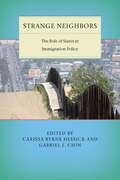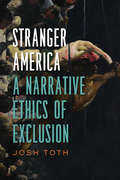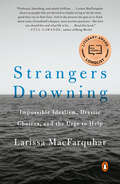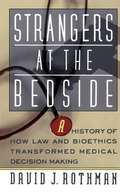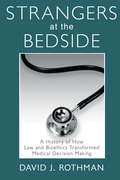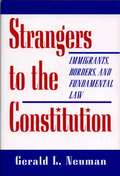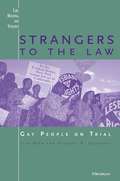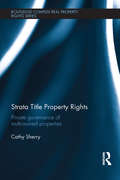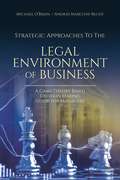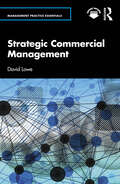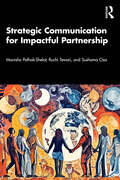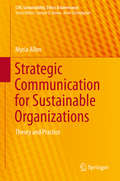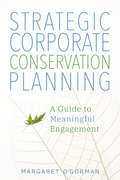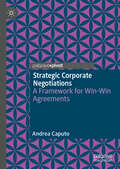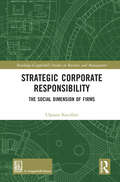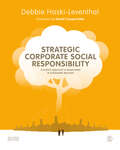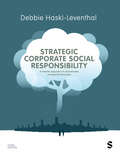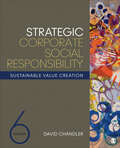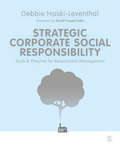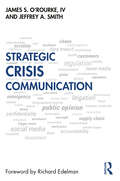- Table View
- List View
Strange Neighbors: The Role of States in Immigration Policy (Citizenship and Migration in the Americas #6)
by Carissa Byrne Hessick and Gabriel J. ChinSince its founding, the U.S. has struggled withissues of federalism and states’ rights. In almost every area of law, fromabortion to zoning, conflicts arise between the states and the federalgovernment over which entity is best suited to create and enforce laws. In thelast decade, immigration has been on the front lines of this debate, withstates such as Arizona taking an extremely assertive role in policingimmigrants within their borders. While Arizona and its notorious SB 1070 is themost visible example of states claiming expanded responsibility to make andenforce immigration law, it is far from alone. An ordinance inHazelton, Pennsylvania prohibited landlords from renting to the undocumented. Severalstates have introduced legislation to deny citizenship to babies who are bornto parents who are in the United States without authorization. Other stateshave also enacted legislation aimed at driving out unauthorized migrants.Strange Neighbors explores the complicated and complicating roleof the states in immigration policy and enforcement, including voices from bothsides of the debate. While many contributors point to the dangers inherent instate regulation of immigration policy, at least two support it, while othersoffer empirically-based examinations of state efforts to regulate immigrationwithin their borders, pointing to wide, state-by-state disparities inlocally-administered immigration policies and laws. Ultimately, the book offersan extremely timely, thorough, and spirited discussion on an issue that willcontinue to dominate state and federal legislatures for years to come.
Stranger America: A Narrative Ethics of Exclusion (Cultural Frames, Framing Culture)
by Josh TothContradictory ideals of egalitarianism and self-reliance haunt America’s democratic state. We need look no further than Donald Trump’s 2016 presidential campaign and victory for proof that early twentieth-century anxieties about individualism, race, and the foreign or intrusive "other" persist today. In Stranger America, Josh Toth tracks and delineates these anxieties in America’s aesthetic production, finally locating a potential narrative strategy for circumnavigating them.Toth’s central focus is, simply, strangeness—or those characters who adamantly resist being fixed in any given category of identity. As with the theorists employed (Nancy, i ek, Derrida, Freud, Hegel), the subjects and literature considered are as encompassing as possible: from the work of Herman Melville, William Faulkner, James Weldon Johnson, and Nella Larsen to that of Philip K. Dick, Woody Allen, Larry David, and Bob Dylan; from the rise of nativism in the early twentieth century to object-oriented ontology and the twenty-first-century zombie craze; from ragtime and the introduction of sound in American cinema to the exhaustion of postmodern metafiction.Toth argues that American literature, music, film, and television can show us the path toward a new ethic, one in which we organize identity around the stranger rather than resorting to tactics of pure exclusion or inclusion. Ultimately, he provides a new narrative approach to otherness that seeks to realize a truly democratic form of community.
Strangers Drowning: Grappling with Impossible Idealism, Drastic Choices, and the Overpowering Urge to Help
by Larissa MacfarquharWhat does it mean to devote yourself wholly to helping others? In Strangers Drowning, Larissa MacFarquhar seeks out people living lives of extreme ethical commitment and tells their deeply intimate stories; their stubborn integrity and their compromises; their bravery and their recklessness; their joys and defeats and wrenching dilemmas. A couple adopts two children in distress. But then they think: If they can change two lives, why not four? Or ten? They adopt twenty. But how do they weigh the needs of unknown children in distress against the needs of the children they already have? Another couple founds a leprosy colony in the wilderness in India, living in huts with no walls, knowing that their two small children may contract leprosy or be eaten by panthers. The children survive. But what if they hadn't? How would their parents' risk have been judged? A woman believes that if she spends money on herself, rather than donate it to buy life-saving medicine, then she's responsible for the deaths that result. She lives on a fraction of her income, but wonders: when is compromise self-indulgence and when is it essential? We honor such generosity and high ideals; but when we call people do-gooders there is skepticism in it, even hostility. Why do moral people make us uneasy? Between her stories, MacFarquhar threads a lively history of the literature, philosophy, social science, and self-help that have contributed to a deep suspicion of do-gooders in Western culture. Through its sympathetic and beautifully vivid storytelling, Strangers Drowning confronts us with fundamental questions about what it means to be human. In a world of strangers drowning in need, how much should we help, and how much can we help? Is it right to care for strangers even at the expense of those we are closest to? Moving and provocative, Strangers Drowning challenges us to think about what we value most, and why.From the Hardcover edition.
Strangers at the Bedside: A History of How Law and Bioethics Transformed Medical Decision Making
by David J. RothmanWhat caused physicians in the USA to confront committees, forms, and active patients? Tracing the revolution that transformed the doctor-patient relationship, this book takes the reader into the laboratory and the examining room, tracing the development of new technologies and social attitudes.
Strangers at the Bedside: A History of How Law and Bioethics Transformed Medical Decision Making (Social Institutions And Social Change Ser.)
by David J. RothmanDavid Rothman gives us a brilliant, finely etched study of medical practice today. Beginning in the mid-1960s, the practice of medicine in the United States underwent a most remarkable--and thoroughly controversial--transformation. The discretion that the profession once enjoyed has been increasingly circumscribed, and now an almost bewildering number of parties and procedures participate in medical decision making.Well into the post-World War II period, decisions at the bedside were the almost exclusive concern of the individual physician, even when they raised fundamental ethical and social issues. It was mainly doctors who wrote and read about the morality of withholding a course of antibiotics and letting pneumonia serve as the old man's best friend, of considering a newborn with grave birth defects a "stillbirth" thus sparing the parents the agony of choice and the burden of care, of experimenting on the institutionalized the retarded to learn more about hepatitis, or of giving one patient and not another access to the iron lung when the machine was in short supply. Moreover, it was usually the individual physician who decided these matters without formal discussions with patients, their families, or even with colleagues, and certainly without drawing the attention of journalists, judges, or professional philosophers.The impact of the invasion of outsiders into medical decision-making, most generally framed, was to make the invisible visible. Outsiders to medicine--that is, lawyers, judges, legislators, and academics--have penetrated its every nook and cranny, in the process giving medicine exceptional prominence on the public agenda and making it the subject of popular discourse. The glare of the spotlight transformed medical decision making, shaping not merely the external conditions under which medicine would be practiced (something that the state, through the regulation of licensure, had always done), but the very substance of medical pract
Strangers in Our Midst: The Political Philosophy of Immigration
by David MillerHow should democracies respond to the millions who want to settle in their societies? David Miller's analysis reframes immigration as a question of political philosophy. Acknowledging the impact on host countries, he defends the right of states to control their borders and decide the future size, shape, and cultural make-up of their populations.
Strangers to the Constitution: Immigrants, Borders, and Fundamental Law
by Gerald L. NeumanGerald Neuman discusses in historical and contemporary terms the repeated efforts of U.S. insiders to claim the Constitution as their exclusive property and to deny constitutional rights to aliens and immigrants--and even citizens if they are outside the nation's borders. Tracing such efforts from the debates over the Alien and Sedition Acts in 1798 to present-day controversies about illegal aliens and their children, the author argues that no human being subject to the governance of the United States should be a "stranger to the Constitution."Thus, whenever the government asserts its power to impose obligations on individuals, it brings them within the constitutional system and should afford them constitutional rights. In Neuman's view, this mutuality of obligation is the most persuasive approach to extending constitutional rights extraterritorially to all U.S. citizens and to those aliens on whom the United States seeks to impose legal responsibilities. Examining both mutuality and more flexible theories, Neuman defends some constitutional constraints on immigration and deportation policies and argues that the political rights of aliens need not exclude suffrage. Finally, in regard to whether children born in the United States to illegally present alien parents should be U.S. citizens, he concludes that the Constitution's traditional shield against the emergence of a hereditary caste of "illegals" should be vigilantly preserved.
Strangers to the Law: Gay People on Trial
by Lisa Keen Suzanne B. GoldbergIn 1992, the voters of Colorado passed a ballot initiative amending the state constitution to prevent the state or any local government from adopting any law or policy that protected a person with a homosexual, lesbian, or bisexual orientation from discrimination. This amendment was immediately challenged in the courts as a denial of equal protection of the laws under the United States Constitution. This litigation ultimately led to a landmark decision by the United States Supreme Court invalidating the Colorado ballot initiative. Suzanne Goldberg, an attorney involved in the case from the beginning on behalf of the Lambda Legal Defense and Education Fund, and Lisa Keen, a journalist who covered the initiative campaign and litigation, tell the story of this case, providing an inside view of this complex and important litigation. Starting with the background of the initiative, the authors tell us about the debates over strategy, the court proceedings, and the impact of each stage of the litigation on the parties involved. The authors explore the meaning of legal protection for gay people and the arguments for and against the Colorado initiative. This book is essential reading for anyone interested in the development of civil rights protections for gay people and the evolution of what it means to be gay in contemporary American society and politics. In addition, it is a rich story well told, and will be of interest to the general reader and scholars working on issues of civil rights, majority-minority relations, and the meaning of equal rights in a democratic society. Suzanne Goldberg is an attorney with the Lambda Legal Defense and Education Fund. Lisa Keen is Senior Editor at the Washington Blade newspaper.
Strata Title Property Rights: Private governance of multi-owned properties (Routledge Complex Real Property Rights Series)
by Cathy SherryMulti-owned properties make up an ever-increasing proportion of commercial, tourist and residential development, in both urban and rural landscapes around the world. This book critically analyses the legal, social and economic complexities of strata or community title schemes. At a time when countries such as Australia and the United States turn ever larger areas into strata title/condominiums and community title/homeowner associations, this book shows how governments, the judiciary and citizens need to better understand the ramifications of these private communities. Whilst most strata title analysis has been technical, focusing on specific sections of legislation, this book provides higher level analysis, discussing the wider economic, social and political implications of Australia’s strata and community title law. In particular, the book argues that private by-laws, however desirable to initial parties, are often economically inefficient and socially regressive when enforced against an ever-changing group of owners. The book will be of particular interest to scholars and legal practitioners of property law in Australia, but as the Australian strata title model has formed the basis for legislation in many countries, the book draws out lessons and analysis that will be of use to those studying privately-owned communities across the world.
Strategic Approaches to the Legal Environment of Business: A Game Theory Based Decision Making Guide for Managers
by Michael O'Brien András Margitay-BechtCurrent and future managers are regularly confronted with decisions that create risk in the legal environment of business. This book provides a framework for qualifying legal risk and then determining if the legal risk is worth taking. This framework begins by looking at the relationship between the firm, its suppliers, customers, owners, agents, and others in society as a whole to understand specific risks in personal injury, agreements, products, borrowing money, employees, independent contractors, and business entity selection. When the manager is aware of the magnitude of the risk and the likelihood of the risk, the manager is in a strong position to determine if the risk is worth taking. This book uses numerous applications from Game Theory to determine how risks of the firm compare to risks of another firm, an employee, a vendor and a customer.°Students of business law will appreciate the black letter legal discussions of civil procedure, torts, contracts, the sale of goods, secured transactions, agency, and business associations with tax implications. Aspiring accounting students will find familiarity with many topics that appear on the AICPA exam. Managers will gravitate toward specific guidance with regard to setting up agreements with customers and vendors, creating effective human relations policies, and mitigating firm risks with regard to internal and external stakeholders. Dozens of managers provided input and experience that found its way into the selection of examples in the book ensuring real-world application for many practical business law problems.
Strategic Commercial Management (Management Practice Essentials)
by David LoweCommercial acumen is a critical skill that underpins the realisation of successful and high-value trading relationships.This concise textbook provides knowledge of the principles of strategic commercial management together with a framework for critically understanding commercial practice within and between organisations. It also examines relevant commercial management best practice and aids the development of the intellectual skills to communicate the rationale behind the strategic commercial decisions made by organisations. Across each chapter, it presents practical and transferable skills for designing, negotiating, awarding and managing B2B transactions.Strategic Commercial Management provides a practical and concise introduction for executive education students currently studying for MSc and MBA apprenticeship programmes, as well as supplementary reading for postgraduate students studying Strategic and Commercial Management.
Strategic Communication for Impactful Partnership
by Manisha Pathak-Shelat Ruchi Tewari Sushama OzaFoundational to partnership-building, strategic communication can result in meaningful and sustainable social impact. This book offers insights into the significance of strategic communication to nurture and sustain partnerships between the civil society, government, and market by aligning their complementary strengths.Grounded in global research and informed by theory and industry practices, the book provides an in-depth analysis of important aspects critical in building multi-sectoral partnerships. It underlines why successful and sustainable partnerships must be initiated with a clear and shared vision, proper planning, and nurtured with care while employing strategic communication to facilitate the entire process. Through clearly articulated case studies, practical tools and techniques, and adaptable frameworks, the authors demonstrate how communication must be intentionally designed and responsive to evolving contexts and how these tools and strategies can be applied in one’s professional work.This book will be of great interest to researchers, academics, and professionals in communication studies, public relations, organisational communication, governance, public policy and administration, political science, sociology, and business and management studies.
Strategic Communication for Sustainable Organizations
by Myria AllenThis is a seminal book for anyone who wants to understand, shape or study the communication surrounding sustainability in their interactions with colleagues, employees, supply chain partners and external stakeholders. It develops essential insights on the basis of an extensive review of relevant theories and research drawn from multiple disciplines. Interview data gathered from organization members who are currently communicating about sustainability in their cities, universities, nongovernmental organizations, small businesses and large for-profit organizations provide valuable insights from a practitioner's perspective. The interviewees represent organizations such as the Portland Trailblazers, Tyson Foods, the City and County of Denver and the Natural Resources Defense Council. Theory, research and interview comments combine in a reader-friendly way to provide practical insights and stimulate future research.
Strategic Corporate Conservation Planning: A Guide to Meaningful Engagement
by Margaret O'GormanIndustries that drive economic growth and support our comfortable modern lifestyles have exploited natural resources to do so. But now there's growing understanding that business can benefit from a better relationship with the environment. Leading corporations have begun to leverage nature-based remediation, restoration, and enhanced lands management to meet a variety of business needs, such as increasing employee engagement and establishing key performance indicators for reporting and disclosures. Strategic Corporate Conservation Planning offers fresh insights for corporations and environmental groups looking to create mutually beneficial partnerships that use conservation action to address business challenges and realize meaningful environmental outcomes. Myriad case studies featuring programs from habitat restoration to environmental educational initiatives at companies like Bridgestone USA, General Motors, and CRH Americas are included to help spark new ideas.
Strategic Corporate Negotiations: A Framework for Win-Win Agreements
by Andrea CaputoExploring the concept of win-win agreements, this book analyses how they pose an important challenge for entrepreneurs, managers and advisors involved in complex negotiations among firms. Providing an overview and discussion of existing literature, the author further develops a theoretical framework for analysing corporate negotiations, and illustrates how this can be implemented in real-life situations. This book presents an empirical case study from the automotive industry and analyses the negotiation between Fiat Chrysler in 2009, offering practical strategies for those involved in corporate negotiations. Presenting how win-win agreements can improve competitive advantage, this book will be an invaluable read for practitioners and scholars alike.
Strategic Corporate Responsibility: The Social Dimension of Firms (Routledge-Giappichelli Studies in Business and Management)
by Ulpiana KocollariIn her book, Dr Ulpiana Kocollari presents a unique contribution to the debate on Corporate Social Responsibility and Sustainability by clearly expressing how the configuration of a firm’s social dimension can help identify inclusive corporate governance models, define innovative management processes and reshape performance measurement systems for the evaluation and assessment of sustainable economic, social and environmental results. Moving a step further, a firm’s social dimension is defined within the configuration of stakeholders – resources – rewards patterns intrinsic to their interactions with their environment and embedded in their business activities. Based on this approach, a framework is provided to guide firms in identifying management activities grounded in and suited to their prevalent patterns, in order to support current and future strategies and establish adequate measurement and communication tools for pursuing their mission. The book contains original theoretical and empirical material and particular attention is paid to the principal social and environmental impact measurement models (i.e. Global Reporting Initiative, Social Return on Investments, Social Balanced Scorecard, etc.), analysing their main features in order to pinpoint their adequacy in assessing the social dimension and to tailor their use more closely to the specific patterns to which they refer. Finally, a detailed application of the analysis framework, which the author has identified is proposed for Innovative Start-Ups with a Social Goal and for Benefit Corporations, in order to detect the patterns embedded in their social dimension and their distinctive traits, which influence their management and measurement processes.
Strategic Corporate Social Responsibility: A Holistic Approach to Responsible and Sustainable Business
by Debbie Haski-LeventhalWith the changing expectations of consumers, employees and regulators, being best in the world is no longer enough. Businesses are now also expected to be best for the world: to be socially and environmentally responsible, sustainable and ethical. Based on the idea that strategic CSR offers the most holistic and effective approach to corporate social responsibility, the author presents the key concepts, theories and philosophical approaches to CSR, along with the practical tools needed to implement this knowledge in the real world. The book is split into three parts; the first part provides the theoretical background of CSR, the second part examines various CSR approaches and how they can be implemented, and the third part discusses measuring and communicating CSR. New this edition is also a chapter titled ‘The S in CSR: Social and Global Issues’. Each chapter contains questions for reflection & discussion, exercises, and case studies from globally recognised brands such as Ben & Jerry′s, Google, H&M, Johnson & Johnson, Nestlé, Patagonia, Puma, Unilever and Whole Foods. The book is complemented by chapter specific lecturer PowerPoint slides, a draft syllabus and an instructor′s manual. Suitable reading for students on Corporate Social Responsibility modules.
Strategic Corporate Social Responsibility: A Holistic Approach to Responsible and Sustainable Business
by Debbie Haski-LeventhalWith the changing expectations of consumers, employees and regulators, being best in the world is no longer enough. Businesses are now also expected to be best for the world: to be socially and environmentally responsible, sustainable and ethical. Based on the idea that strategic CSR offers the most holistic and effective approach to corporate social responsibility, the author presents the key concepts, theories and philosophical approaches to CSR, along with the practical tools needed to implement this knowledge in the real world. The book is split into three parts; the first part provides the theoretical background of CSR, the second part examines various CSR approaches and how they can be implemented, and the third part discusses measuring and communicating CSR. New this edition is also a chapter titled ‘The S in CSR: Social and Global Issues’. Each chapter contains questions for reflection & discussion, exercises, and case studies from globally recognised brands such as Ben & Jerry′s, Google, H&M, Johnson & Johnson, Nestlé, Patagonia, Puma, Unilever and Whole Foods. The book is complemented by chapter specific lecturer PowerPoint slides, a draft syllabus and an instructor′s manual. Suitable reading for students on Corporate Social Responsibility modules.
Strategic Corporate Social Responsibility: A Holistic Approach to Sustainable and Impactful Business
by Debbie Haski-LeventhalIn today′s world, being the best in the world is no longer enough. Businesses are now expected to be the best for the world: socially and environmentally responsible, sustainable, and ethical. This updated edition of Strategic Corporate Social Responsibility offers a comprehensive approach to CSR, presenting key concepts, theories, and practical tools for real-world application. The book is divided into three parts: theoretical background, CSR approaches and implementation, and measuring and communicating CSR. New to this edition is a chapter on social and global issues, along with three new case studies from Africa, Asia, and Latin America. The content has been extensively revised, adding summary questions at the end of each chapter and highlighting cutting-edge technology, including AI, machine learning, virtual reality, and blockchain. Featuring case studies from globally recognized brands like Ben & Jerry′s, Google, H&M, and Unilever, this book is an essential resource for students on Corporate Social Responsibility modules. Debbie Haski-Leventhal is Professor of Management at Macquarie Business School and an expert on corporate social responsibility (CSR), responsible management education (RME) and volunteerism. Detailed updates for the 3rd edition: Nearly half the book is rewritten. The book is restructured for a better flow, as are many of its chapters. It now has many new images and figures too New cases from outside the US, such as Fairphone (The Netherlands), Sony (Japan), and Lush (The UK) and many new mini cases from around the globe, including Egypt, Bangladesh, and China A new and more holistic definition of Strategic CSR, with six original components An emphasis on how cutting-edge technologies, such as AI, machine learning, virtual reality and blockchains, can serve responsible and sustainable business Each chapter now ends with summary questions that be used in class or for assessment A new and powerful Foreword by Professor David Cooperrider, a CSR leader and the father of appreciative inquiry, and several new endorsements Additional exercises and questions for interactive learning together with revised online materials, such as a teaching gu
Strategic Corporate Social Responsibility: A Holistic Approach to Sustainable and Impactful Business
by Debbie Haski-LeventhalIn today′s world, being the best in the world is no longer enough. Businesses are now expected to be the best for the world: socially and environmentally responsible, sustainable, and ethical. This updated edition of Strategic Corporate Social Responsibility offers a comprehensive approach to CSR, presenting key concepts, theories, and practical tools for real-world application. The book is divided into three parts: theoretical background, CSR approaches and implementation, and measuring and communicating CSR. New to this edition is a chapter on social and global issues, along with three new case studies from Africa, Asia, and Latin America. The content has been extensively revised, adding summary questions at the end of each chapter and highlighting cutting-edge technology, including AI, machine learning, virtual reality, and blockchain. Featuring case studies from globally recognized brands like Ben & Jerry′s, Google, H&M, and Unilever, this book is an essential resource for students on Corporate Social Responsibility modules. Debbie Haski-Leventhal is Professor of Management at Macquarie Business School and an expert on corporate social responsibility (CSR), responsible management education (RME) and volunteerism. Detailed updates for the 3rd edition: Nearly half the book is rewritten. The book is restructured for a better flow, as are many of its chapters. It now has many new images and figures too New cases from outside the US, such as Fairphone (The Netherlands), Sony (Japan), and Lush (The UK) and many new mini cases from around the globe, including Egypt, Bangladesh, and China A new and more holistic definition of Strategic CSR, with six original components An emphasis on how cutting-edge technologies, such as AI, machine learning, virtual reality and blockchains, can serve responsible and sustainable business Each chapter now ends with summary questions that be used in class or for assessment A new and powerful Foreword by Professor David Cooperrider, a CSR leader and the father of appreciative inquiry, and several new endorsements Additional exercises and questions for interactive learning together with revised online materials, such as a teaching gu
Strategic Corporate Social Responsibility: Sustainable Value Creation
by David ChandlerStrategic Corporate Social Responsibility: Sustainable Value Creation (Sixth Edition) redefines corporate social responsibility (CSR) as being central to the value-creating purpose of the firm. Based on a theory of empowered stakeholders, this bestselling text argues that the responsibility of a corporation is to create value, broadly defined. The primary challenge for managers today is to balance the competing interests of the firm’s stakeholders’ understanding that what they expect today may not be what they will expect tomorrow. This tension is what makes CSR so complex and demanding, but it is also what makes CSR integral to the firm’s strategy and day-to-day operations. In this new Sixth Edition, author David Chandler explores issues around COVID-19, the BLM movement, the supply chain crunch, and the "great resignation."
Strategic Corporate Social Responsibility: Sustainable Value Creation
by David ChandlerStrategic Corporate Social Responsibility: Sustainable Value Creation (Sixth Edition) redefines corporate social responsibility (CSR) as being central to the value-creating purpose of the firm. Based on a theory of empowered stakeholders, this bestselling text argues that the responsibility of a corporation is to create value, broadly defined. The primary challenge for managers today is to balance the competing interests of the firm’s stakeholders’ understanding that what they expect today may not be what they will expect tomorrow. This tension is what makes CSR so complex and demanding, but it is also what makes CSR integral to the firm’s strategy and day-to-day operations. In this new Sixth Edition, author David Chandler explores issues around COVID-19, the BLM movement, the supply chain crunch, and the "great resignation."
Strategic Corporate Social Responsibility: Tools and Theories for Responsible Management
by Dr Debbie Haski-LeventhalWith the changing expectations of consumers, employees and regulators, being best in the world is no longer enough. Businesses are now also expected to be best for the world: to be socially and environmentally responsible, sustainable and ethical. Based on the idea that strategic CSR offers the most holistic and effective approach to corporate social responsibility, the author presents the key concepts, theories and philosophical approaches to CSR, along with the practical tools needed to implement this knowledge in the real world. The book is split into three parts; the first part provides the theoretical background of CSR, the second part examines various CSR approaches and how they can be implemented, and the third part discusses measuring and communicating CSR. Each chapter contains questions for reflection & discussion, exercises, and case studies from globally recognised brands such as Ben & Jerry’s, Nestle, Marks & Spencer, TOMS Shoes, LEGO, Coca-Cola and McDonald’s. The book is complemented by chapter specific lecturer PowerPoint slides, which can be found here. Suitable reading for students on Corporate Social Responsibility modules.
Strategic Corporate Social Responsibility: Tools and Theories for Responsible Management
by Dr Debbie Haski-LeventhalWith the changing expectations of consumers, employees and regulators, being best in the world is no longer enough. Businesses are now also expected to be best for the world: to be socially and environmentally responsible, sustainable and ethical. Based on the idea that strategic CSR offers the most holistic and effective approach to corporate social responsibility, the author presents the key concepts, theories and philosophical approaches to CSR, along with the practical tools needed to implement this knowledge in the real world. The book is split into three parts; the first part provides the theoretical background of CSR, the second part examines various CSR approaches and how they can be implemented, and the third part discusses measuring and communicating CSR. Each chapter contains questions for reflection & discussion, exercises, and case studies from globally recognised brands such as Ben & Jerry’s, Nestle, Marks & Spencer, TOMS Shoes, LEGO, Coca-Cola and McDonald’s. The book is complemented by chapter specific lecturer PowerPoint slides, which can be found here. Suitable reading for students on Corporate Social Responsibility modules.
Strategic Crisis Communication
by Jeffrey Smith James S O'RourkeAddressing 21st-century issues, threats, and opportunities with time-tested principles, this book empowers corporate communications professionals to protect, inspire, and energize organizations in the face of a crisis. Whether due to an external incident or an internal misstep, every major company or institution will find itself scrutinized, its normal operations disrupted, and its reputation and business continuity threatened at some point—and how it prepares for, and reacts to, a crisis can make a critical difference in the ultimate outcome of events. This book focuses on strategic crisis communication as a function of three elements: 1. crisis preparation—establishing a robust and nimble infrastructure and plans, in advance of any crisis 2. crisis management—rapidly gathering information, activating and adjusting plans, making decisions, and relentlessly monitoring outcomes 3. crisis communication—reaching multiple audiences, on multiple platforms, with clear, consistent, and purposeful messages that tell the truth and defend the organization. Bringing together best practices gleaned from hundreds of recent case studies, this book is an unmatched resource enabling corporate communications and PR professionals, and the organizations that employ them, to understand how to weather any reputational storm that may threaten their enterprise.
